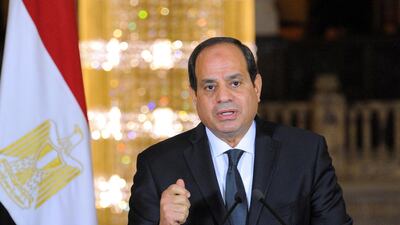President Abdel Fattah El Sisi assured Egyptians the country would eventually secure the results it has been seeking from years of negotiations with Ethiopia and Sudan over the operation of the massive hydroelectric dam Addis Ababa is building on the Nile.
On a talk show broadcast by the MBC Masr channel on Saturday, Mr El Sisi said Egyptians should not worry about the impact of the Grand Ethiopian Renaissance Dam on their country’s share of the Nile waters, as long as they stayed “united and steadfast”.
Egypt is also undertaking multibillion-dollar projects to maximise the use of available water through recycling, reduction of waste and by building desalination plants, he said.
Mr El Sisi has said maintaining the country’s share of Nile waters, which supply more than 90 per cent of its needs, was an existential issue for Egypt and that Cairo would never accept a de facto situation imposed on it. But his latest comments appeared reconciliatory.
"We are fighting in the negotiations so we can secure and protect Egypt's rights, but I will not say whether things are moving along or not," he told Amr Adeeb, host of the popular talk show El Hekayah.
“For sure, we will reach the results through negotiations and patience ... as well as our steadfastness as Egyptians. We should not be worried.”
Negotiations between Egypt, Ethiopia and Sudan over the dam began a decade ago. Ethiopia refuses to enter a legally binding deal that includes mechanisms for dealing with future droughts or disputes over the dam’s operation.
On completion, it will be Africa’s largest dam and produce 6,000 megawatts of electricity, enough to enable Addis Ababa to export the surplus.
The dam is built on the Blue Nile, the Nile’s main tributary. It flows into Sudan and meets the White Nile in Khartoum, from where the river travels north to the Mediterranean through the Sudanese and Egyptian deserts.
Mr El Sisi spoke about the dam earlier on Saturday during an online African Union summit in which South Africa handed the bloc’s rotating chairmanship to Democratic Republic of Congo.
He told DRC President Felix Tshisekedi that Cairo was confident that, under his chairmanship, Egypt would reach a binding agreement on the dam before Addis Ababa goes ahead with the second filing of the dam reservoir this summer.
Egypt and Sudan were angered when Ethiopia went ahead with the first filling last year without giving them prior notice. Ethiopia said it did not have to give advance warning because it was a matter of national sovereignty.
Addressing the AU summit later, Sudan’s Prime Minister Abdalla Hamdok said the dam posed a threat to 20 million Sudanese people, roughly half the country’s population. Mr Hamdok’s government has repeatedly said it wants Ethiopia to share data on the operation of the dam to prevent flooding and protect its own power-generating dams on the Blue Nile.
“Sudan wants a solution that safeguards the rights of everyone and that is within the boundaries of international law,” said Mr Hamdok, a former UN economist who took office in 2019.
His water minister, Yasser Abbas, told Reuters on Saturday that Sudan wanted the US, the EU and the AU to mediate in the dispute.
He said a second unilateral filling of the dam's reservoir would pose a threat to Sudan’s national security. He did not say how Sudan would respond if Ethiopia went ahead anyway.























